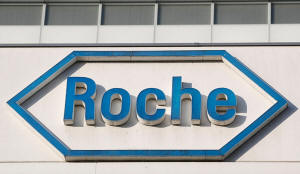Roche touts early trial success of second obesity drug candidate
 Send a link to a friend
Send a link to a friend
 [July 17, 2024]
By Ludwig Burger and Paolo Laudani [July 17, 2024]
By Ludwig Burger and Paolo Laudani
(Reuters) -Roche said on Wednesday a second drug candidate from its
purchase of Carmot Therapeutics yielded positive results in an
early-stage trial, as the Swiss drugmaker asserted itself as a late
contender in the race to develop obesity drugs.
Roche's experimental once-daily pill CT-996 resulted in a
placebo-adjusted average weight loss of 6.1% within four weeks in obese
patients without diabetes in a Phase I trial, Roche said in a statement.
The stock gained 6.1% at 1025 GMT to a one-year high, a similar market
reaction to positive trial results from another Carmot drug that Roche
reported in May.
Roche is among a growing number of would-be rivals to Novo Nordisk and
Eli Lilly, whose weight-loss injections have been in feverish demand,
with experts boosting their sales forecasts for such treatments to as
much as $150 billion by the early 2030s.
Roche's experimental pill, which could appeal to patients averse to
injections, was well tolerated with mostly mild or moderate
gastrointestinal side effects similar to those seen in other weight-loss
drugs, according to the statement.
Roche, however, faces a crowded and fast-advancing field in the quest to
offer pills to replace weekly shots without compromising on weight loss.
Structure Therapeutics last month reported 6.2% average placebo-adjusted
weight loss after 12 weeks from its pill in a Phase II trial.
Lilly's oral drug candidate orforglipron had shown weight loss of about
6% to 7% in the same period.

[to top of second column]
|

The logo of Swiss drugmaker Roche is seen at its headquarters in
Basel, Switzerland January 30, 2020. REUTERS/Arnd Wiegmann/File
Photo
 Pfizer last week mapped out trial
plans for a reworked once-a-day pill, while Viking Therapeutics in
March reported placebo-adjusted weight loss of 3.3% after four weeks
for its experimental pill.
J.P. Morgan analysts said Roche's data looked competitive but the
comparison was fraught with uncertainty.
Manu Chakravarthy, who heads metabolic drug development at Roche,
said the race for easy-to-produce small-molecule chemical compounds
against obesity was wide open.
Any unintended effects of the drug class were more difficult to
predict than for the peptides in recently established obesity drugs,
the executive said.
"Having worked with many small molecules for most of my life, I can
say it's never over until it's over. It's a very different beast
from an injectable formulation," Chakravarthy said.
Roche will now focus on advancing CT-996 to the second of three
phases of testing on humans next year, he said.
Another drug candidate known as CT-388 from Roche's Carmot takeover,
a self-administered once-weekly injection like Novo and Lilly's
leading products, succeeded in a Phase I trial in May.
Roche in December agreed to take over Carmot for $2.7 billion
upfront, joining other companies seeking to challenge the dominant
makers of weight-loss drugs Novo and Lilly.
(Reporting by Paolo Laudani, Editing by Bernadette Baum, Louise
Heavens and Arun Koyyur)
[© 2024 Thomson Reuters. All rights reserved.]This material may not be published,
broadcast, rewritten or redistributed.
Thompson Reuters is solely responsible for this content. |